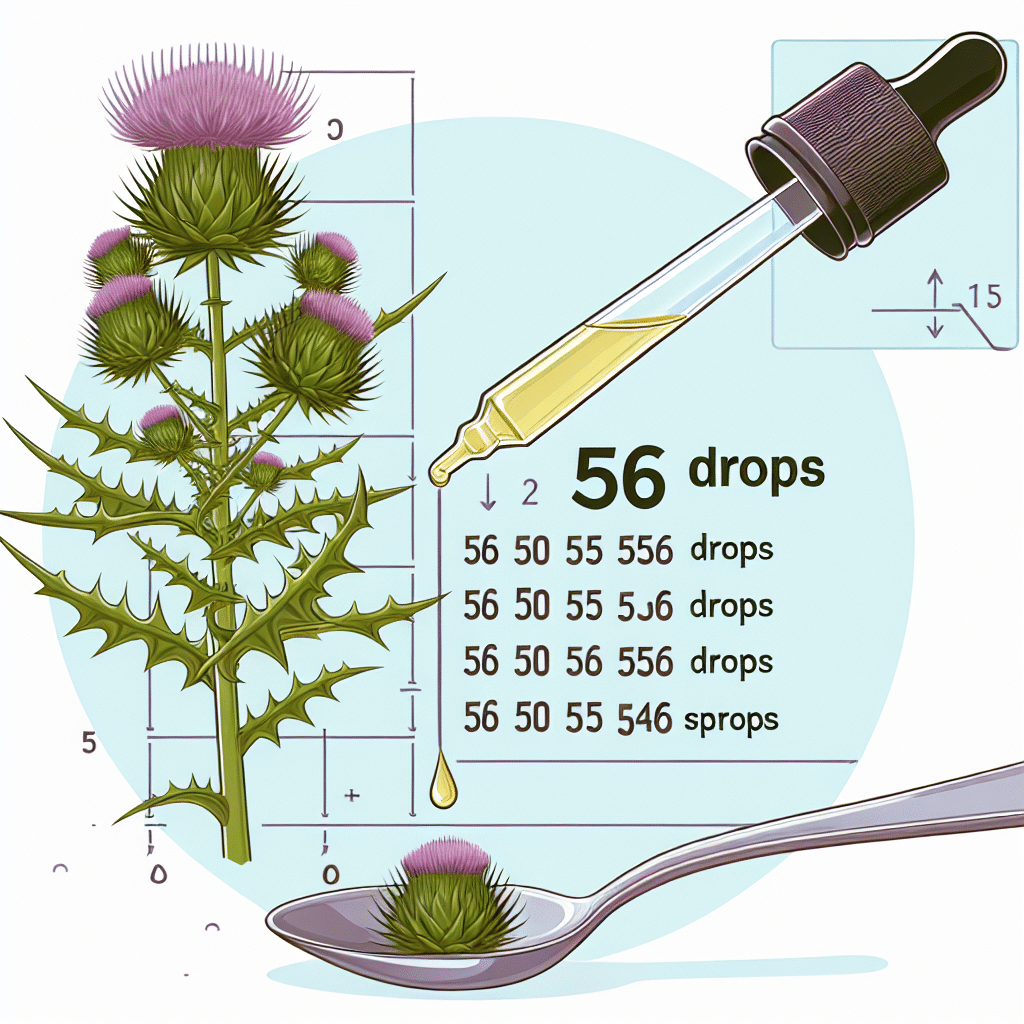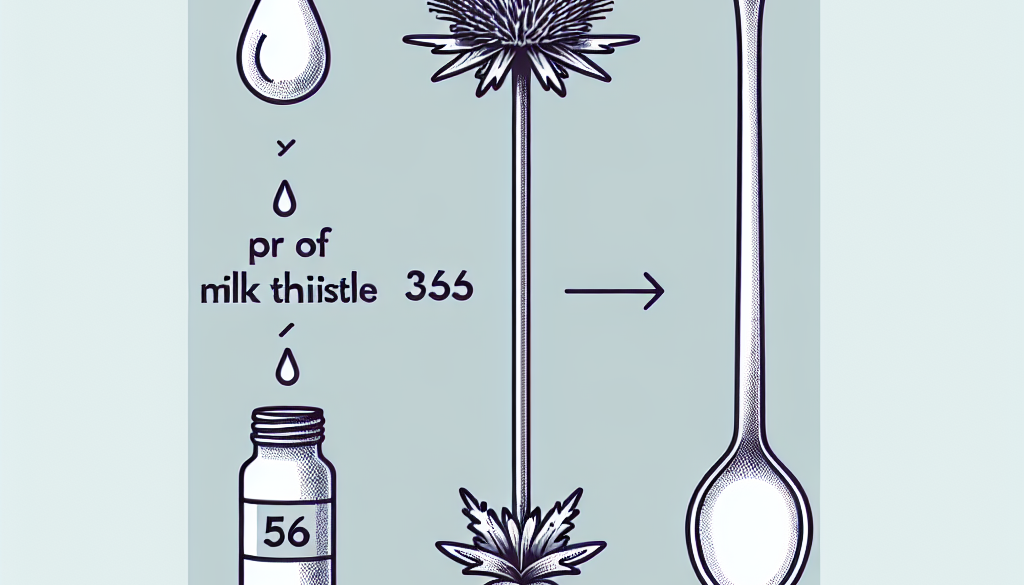How Many Teaspoons in 56 Drops of Milk Thistle?
-
Table of Contents
- Teaspoons to Drops Conversion: Measuring Milk Thistle Dosage
- Understanding Measurement Units in Herbal Supplementation
- Conversion Factors: Drops to Teaspoons
- Calculating the Conversion for 56 Drops of Milk Thistle
- The Importance of Precise Measurement in Milk Thistle Supplementation
- Case Studies and Statistics on Milk Thistle Usage
- Conclusion: The Significance of Dosage Accuracy
- Explore ETchem’s Protein Products
Teaspoons to Drops Conversion: Measuring Milk Thistle Dosage

When it comes to natural supplements like milk thistle, precision in dosage is key to both safety and efficacy. Milk thistle, known for its potential liver-protective properties, is often administered in various forms, including liquid drops. Understanding the conversion between drops and more commonly used measurements like teaspoons can be crucial for proper usage. In this article, we will explore the conversion of 56 drops of milk thistle into teaspoons and delve into the importance of accurate dosing.
Understanding Measurement Units in Herbal Supplementation
Before we can convert drops to teaspoons, it’s essential to understand the standard measurement units used in herbal supplementation and why precision matters.
- Drops: A drop is a unit of volume often used in the dispensing of liquid supplements. The exact volume of a drop can vary depending on the dropper and the viscosity of the liquid.
- Teaspoons: A teaspoon is a more standardized unit of volume, commonly used in cooking and sometimes in dosing liquid medications. One teaspoon is equivalent to about 5 milliliters.
Accurate dosing is important to ensure that one receives the intended therapeutic effects without overconsumption, which could lead to side effects or toxicity.
Conversion Factors: Drops to Teaspoons
To convert drops to teaspoons, we need to establish a standard conversion factor. However, this can be challenging because the size of a drop can vary. For the purpose of this article, we will use the pharmaceutical standard where one drop from a standard dropper is approximately 0.05 milliliters. Therefore, 20 drops would be roughly equivalent to 1 milliliter.
Calculating the Conversion for 56 Drops of Milk Thistle
Using the standard conversion factor, we can calculate the number of teaspoons in 56 drops of milk thistle:
- 1 drop = 0.05 milliliters
- 56 drops = 56 * 0.05 milliliters
- 56 drops = 2.8 milliliters
- Since 1 teaspoon = 5 milliliters, we divide 2.8 milliliters by 5.
- 2.8 milliliters ≈ 0.56 teaspoons
Therefore, 56 drops of milk thistle are approximately equal to just over half a teaspoon.
The Importance of Precise Measurement in Milk Thistle Supplementation
Milk thistle is often recommended for its silymarin content, a group of compounds believed to have antioxidant and anti-inflammatory properties. The dosage of milk thistle can vary depending on the concentration of silymarin and the intended use. This is why precise measurement is crucial:
- To ensure the therapeutic threshold is reached without exceeding it.
- To avoid potential side effects associated with high doses.
- To maintain consistency in daily supplementation routines.
It’s also important to note that professional healthcare advice should be sought before starting any new supplement regimen.
Case Studies and Statistics on Milk Thistle Usage
Several studies have highlighted the importance of dosage in the effectiveness of milk thistle. For instance, research suggests that silymarin’s bioavailability can be low, and therefore, precise dosing is necessary to achieve the desired plasma concentrations. Additionally, clinical trials often use standardized doses to assess the efficacy of milk thistle, further emphasizing the need for accurate measurement.
Conclusion: The Significance of Dosage Accuracy
In conclusion, while the conversion of 56 drops of milk thistle to teaspoons may seem like a simple mathematical exercise, it underscores the broader importance of dosage accuracy in herbal supplementation. Just over half a teaspoon of milk thistle, as calculated from 56 drops, can provide a reference for consumers looking to understand how their supplementation translates into more familiar measurement units.
Explore ETchem’s Protein Products
If you’re interested in high-quality protein supplements, consider exploring ETchem’s range of collagen products. They offer a variety of collagen types sourced from marine, fish, bovine, and chicken origins, catering to different dietary preferences and needs. ETchem’s products are known for their neutral taste and instant solubility, making them an excellent addition to any health and wellness routine.
About ETChem:
ETChem, a reputable Chinese Collagen factory manufacturer and supplier, is renowned for producing, stocking, exporting, and delivering the highest quality collagens. They include marine collagen, fish collagen, bovine collagen, chicken collagen, type I collagen, type II collagen and type III collagen etc. Their offerings, characterized by a neutral taste, instant solubility attributes, cater to a diverse range of industries. They serve nutraceutical, pharmaceutical, cosmeceutical, veterinary, as well as food and beverage finished product distributors, traders, and manufacturers across Europe, USA, Canada, Australia, Thailand, Japan, Korea, Brazil, and Chile, among others.
ETChem specialization includes exporting and delivering tailor-made collagen powder and finished collagen nutritional supplements. Their extensive product range covers sectors like Food and Beverage, Sports Nutrition, Weight Management, Dietary Supplements, Health and Wellness Products, ensuring comprehensive solutions to meet all your protein needs.
As a trusted company by leading global food and beverage brands and Fortune 500 companies, ETChem reinforces China’s reputation in the global arena. For more information or to sample their products, please contact them and email karen(at)et-chem.com today.




